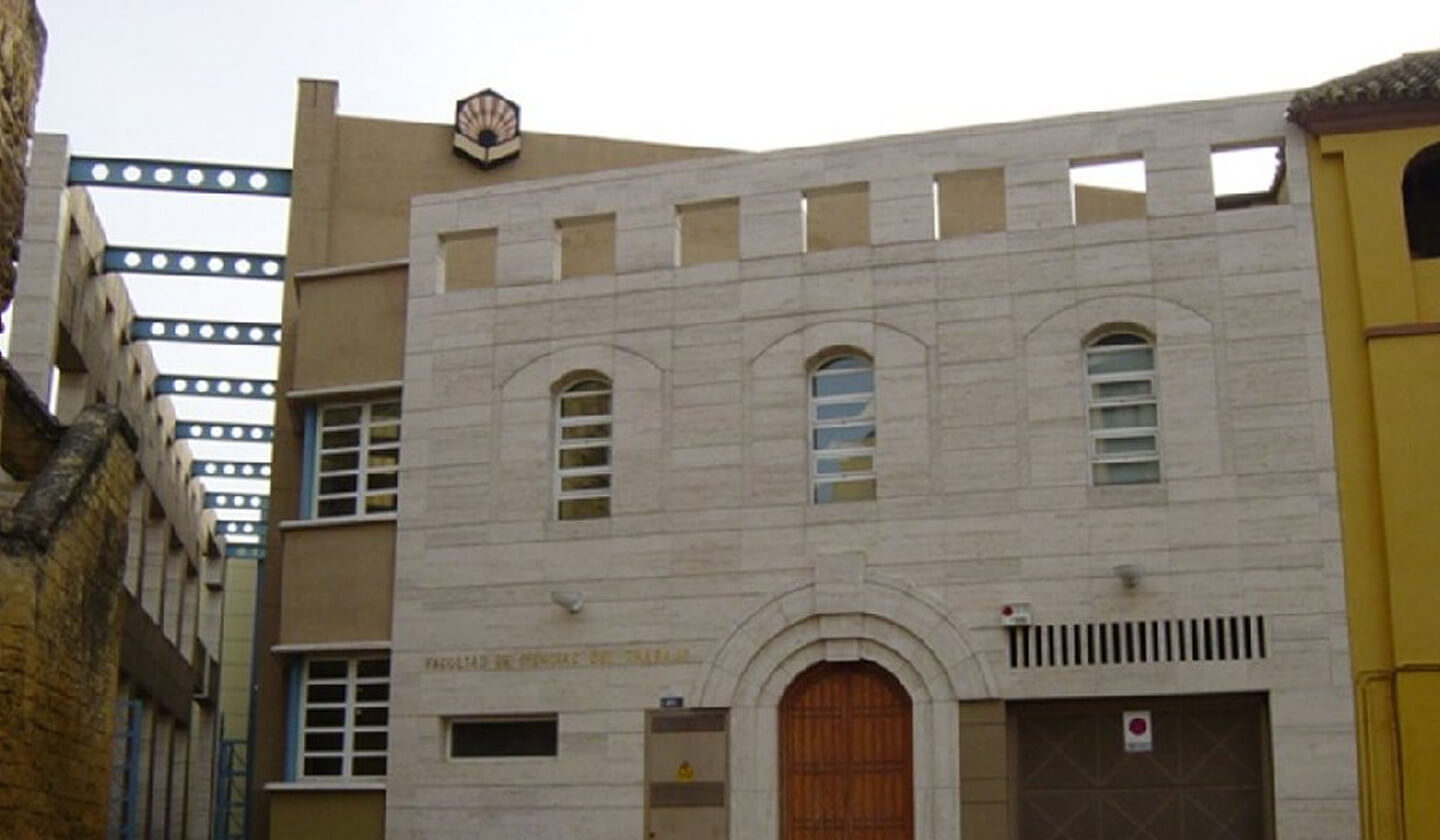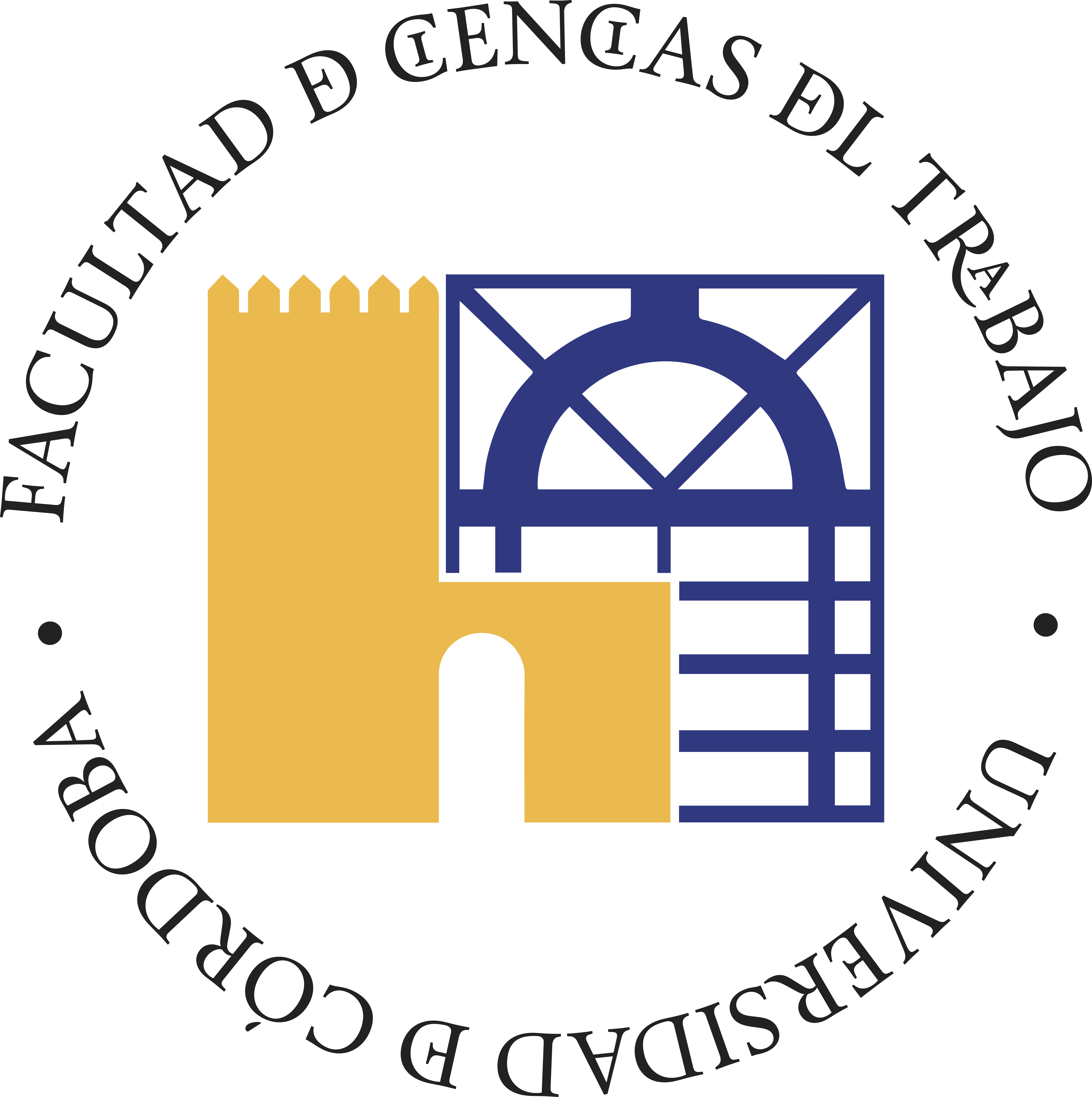Secretariat
Presentation
The Secretariat of the Faculty of Labor Sciences is responsible for efficiently managing and administering all administrative processes that affect the academic development of the official degrees offered at this center. Its role supports the smooth running of academic activities for both students and teaching staff.
Location
The Secretariat is located in the main hallway of the Faculty of Labor Sciences (C/ Adarve 30)
Public Service Hours: Monday to Friday, 9:00 AM to 1:00 PM.
- Secretariat: 957 21 89 06 - 957 21 25 26
- Director's Secretariat: 957 21 10 87
- Center Administrator: 957 21 25 29
- Fax: 957/ 21 89 08
- Email Address: This email address is being protected from spambots. You need JavaScript enabled to view it.
The Main Processes Managed by the Secretariat
Various Applications
- Generic Application for Submission to the Faculty of Labor Sciences
This form can be used by the student in a generic manner to submit any request related to the management of their academic record (provided there is no specific procedure for it)
In the "EXPONE" section, the applicant should provide a brief description of the arguments on which their request is based. In the "SOLICITA" section, they must indicate the specific request they are making for resolution by the relevant authority. In the "AUTHORITY TO WHOM THE REQUEST IS ADDRESSED" section, the applicant should indicate the title of the person to whom the request is directed (e.g., "Dean of the Faculty of Labor Sciences").
Once completed and signed, the form should be submitted to the Secretariat of the Faculty of Labor Sciences for registration and processing..
- Generic Application via UCO's Electronic Headquarters.
- Incorporation of B1 Language Level into Academic Record:
Request for Academic Certificate
Request for Issuance of Official Degree
Refund of Public Fees
- If, for any reason, a student is entitled to a refund of all or part of the public fees paid, they must request it using the standard form at the Faculty Secretariat. Along with the request, the following documentation must be provided:
- Photocopy of the ID (DNI)
- Original bank receipt or proof of payment
- Documentation justifying the refund
- Photocopy of the enrollment receipt
► Notice Board
DESCRIPTION OF THE STUDIES
The joint itinerary of the Degree in Tourism and the Degree in Translation and Interpreting is framed within the branches of Arts and Humanities, and Social and Legal Sciences. Its curriculum offers training that covers, on the one hand, territorial planning to economic analysis, including business management, service marketing, cultural and psychosocial components of the phenomenon, and the legal regulations governing the activity; and, on the other hand, the use of tools for translation, IT, audiovisual media, or interpreting, along with proficiency in a third language (Language C) at a B1 level. The program emphasizes foreign language teaching and prepares students for professional work in areas such as translation, education, the publishing sector, and the management of tourism resources and tourism businesses.
PPROFESSIONAL PROFILE AND JOB OPPORTUNITIES
From a professional standpoint, this Double Degree allows graduates to enter various sectors related to language use and any area within the tourism industry (accommodation, restaurants, intermediary services, transport, destination and tourism product planning). Notable opportunities include:
- Translation and interpreting in institutions, companies, and international organizations (European Union, European Commission)
- Teaching (Secondary and High School education)
- Text editing (literary editor or advisor for publishing houses)
- Teaching Spanish as a foreign language or teaching foreign languages
- Linguistic advisory roles in state administration, commercial, healthcare, administrative, and legal sectors
- Conference interpreting, press conferences, book or movie presentations
- Documentation work (documentalist)
- Diplomacy
- Translation in the audiovisual sector (films, video games)
- Linguistic and intercultural mediation, including for communication disabilities
- Research (universities and public administration institutions)
- Multilingual secretarial work
- Writing and collaborating with newspapers
- Literary production
- Managing tourism businesses
- Working in public institutions as a management or planning technician, responsible for tourism development programs, tourism development agents, directors or technicians in institutions promoting tourism products, or tourism consultants.
SKILLS ACQUIRED BY THE STUDENT
This joint itinerary aims for students to acquire skills in communication and translation in foreign languages (English and other modern languages), the use of necessary resources for language study and documentary sources in multiple foreign languages, as well as the use of ICT and the ability to work in interdisciplinary and international teams. It also aims to develop the skills necessary for the scientific study and management of destinations, tourism resources, political-administrative tourism structures, and business sectors on a global level. Simultaneously, it seeks to introduce new professional profiles and develop existing ones, primarily practical ones, with a view toward their professional careers. This is achieved through the acquisition of basic competencies and knowledge that enable professional practice and continuous learning.

External Mobility Office
- Information Location: Secretariat
- Contact Person: Inmaculada Lara Merino
- Email: This email address is being protected from spambots. You need JavaScript enabled to view it.
- Phone: +34 957 212 526
- Fax: +34 957 218 908
- Skype: Secretaria RRLL
- Mobility Coordinator: Virginia Navajas Romero
- Email: This email address is being protected from spambots. You need JavaScript enabled to view it.
- Phone: 957 21 25 09
Main Functions of the External Relations Office
- Provide advice on the center’s mobility programs for UCO faculty and students, both in person and via email.
- Offer guidance on international mobility programs to foreign faculty and students, primarily via email.
- Manage the necessary documentation for national and international mobility of faculty and students, both "incoming" and "outgoing."
- Support in coordinating this center's exchange and mobility programs with foreign and national universities.
- Process requests for recognition of courses from partner universities in the center’s exchange programs.
- Coordinate Erasmus tutors.
- Coordinate students participating in Erasmus internships.
General Information
| Degree Name | Graduate in Tourism |
| Number of new student places offered | 90 |
| Minimum number of credits for enrollment | 24 credits |
| Faculty and location | Faculty of Labour Sciences |
| Publication in BOE | anuary 29, 2015 / BOE No. 25 / Download |
| Year of title implementation | 2010-2011 |
| Number of courses in the implementation phase | 1st, 2nd, 3rd, and 4th (2013-2014) |
| Field of knowledge | Social and Legal Sciences |
| Program Duration | 240 credits / 4 years |
| Type of teaching | On-site |
| Languages used | Spanish, modern language (English, German/French) |
Degree Justification
The Degree in Tourism has a unique and specific professional, scientific, and educational profile. Its multidimensional nature means that the study of tourism has been approached from various scientific perspectives, including territorial planning, economic analysis, business management, service marketing, cultural and psychosocial aspects of the phenomenon, and the legal regulations governing the activity, among others.
The globalization of tourism activities has created new markets and, therefore, increased competitiveness among destinations, which must be won by offering new and better products and services. This requires professionals with a high level of qualification for both public and private management. Therefore, the existence of a Degree in Tourism is necessary to train professionals who will work in the tourism sector in the following areas
- Accommodation
- Restaurants
- Intermediary services
- Transport and logistics
- Public destination planning and management
- Tourism products and activities
- Education, research, and consultancy
Career Opportunities
Academic Opportunities
Graduates in Tourism will have access to further studies. This includes postgraduate programs and continuing education courses at the Faculty of Labour Sciences closely related to the degree, as well as other postgraduate degrees, master's programs, and doctoral programs at the University of Córdoba.
Professional Opportunities
The Degree in Tourism offers graduates a wide range of career opportunities:
- Working in the private sector within any area of tourism businesses (accommodation, restaurants, intermediary services, and transport)
- Working in public institutions as management or planning specialists, responsible for tourism development programs, tourism development agents, or directors/technicians of institutions promoting tourism products
- Working in tourism consultancy
- Teaching (both in secondary education and at universities)
- Conducting research.
Competencies
Basic Competencies
- Analytical and synthesis skills
- Organizational and planning skills
- Oral and written communication in Spanish
- Teamwork
- Interpersonal skills
- Critical thinking
- Autonomous learning
- Ethical commitment to contribute to a fairer society that respects fundamental rights
- Knowledge and skills for successfully pursuing postgraduate studieso
University Competencies
- Proficiency in a foreign language
- Mastering ICT skills
- Fostering active job search habits and entrepreneurial skills
Specific Competencies
- Understand the principles and impacts of tourism: spatial-territorial, social, cultural, political, labour, and economic dimensions
- Understand the dynamic and evolving nature of tourism and the leisure society
- Analyze and understand the social, economic, and environmental impacts of tourism
- Understand the main political-administrative structures related to tourism and the key stakeholders in the tourism industry
- Understand the legal framework governing tourism activities
- Ability to follow procedures before institutions
- Select, analyze, manage, interpret, and synthesize information applied to the tourism sector
- Understand and apply the basic concepts of Law
- Understand and apply the basic concepts of Business Management
- Understand and apply the basic concepts of Statistics
- Understand and apply the basic concepts of Economics
- Understand and apply the basic concepts of Geography
- Identify and manage tourism destination spaces
- Understand the objectives, strategies, and tools for tourism planning
- Understand the operation of global tourism destinations and structures, as well as business sectors
• Manage different types of tourism entities
• Plan and manage resources in tourism organizations - Define objectives, strategies, and commercial policies in tourism
- Understand the operational procedures of tourism companies (accommodation, restaurants, and intermediary services)
- Evaluate tourism potential and conduct prospective analysis to detect infrastructure and tourism facility planning needs
- Manage tourism territories and resources according to sustainability principles
- Understand the main initiatives to enhance cultural heritage
- Understand the characteristics of cultural heritage management
- Turn an empirical problem into a research object and develop conclusions
- Work in English as a foreign language
- Communicate orally and in writing in a second foreign language
- Work in different cultural environments from a linguistic perspective
Enrollment Regulations (FAQs)
According to the Academic Regulations of Official Degree Studies at the University of Córdoba (approved by the Governing Council on July 19, 2019, amended on July 2, 2020):
- What types of enrollment are allowed at the University of Córdoba?
- Full-time: Students enroll in a minimum of 60 ECTS credits and a maximum of 78 credits.
- Part-time: For justified reasons (work, family responsibilities, special educational needs, etc.), students may enroll in 24 to 36 credits for degrees and 30 to 36 for master's programs..
- Is it possible to change the enrollment type?
Changes can only be made at the time of a new enrollment. - How many exam attempts are allowed for each subject?
Six attempts per subject. - When is an attempt considered used?
Only when the student participates in the evaluation process. - What happens if all six attempts are exhausted without passing the subject?
Students may request an extraordinary attempt. - How many credits must a student pass to continue their studies?
First-year students must pass a minimum of six credits.. - How many years can a student remain in a degree program?
Full-time: 7 years; Part-time: 10 years. - Can exams be taken early to finish the degree faster?
Students who have completed 85% of the credits can request an early exam.


